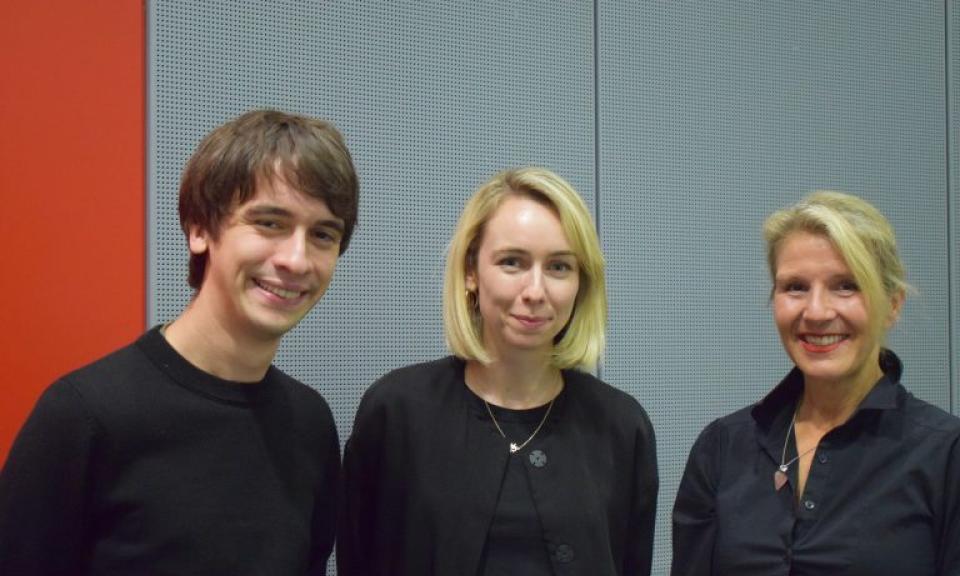
Content strategy, delivery and analysis have come a long way since the days of paid for advertising. Content creators need to connect with audiences across multi-channel media outlets, available 24/7. In an environment where the discerning consumer and their needs are key, marketeers need to be increasingly more creative and intelligent with their content.
These were just some of the conclusions made at the Content Strategy panel hosted by the Business School’s Marketing Professional Interest Network (19 Sept). The event was attended by over 80 alumni, students and marketing professionals. The marketing panel included (L-R):
- John Montoya – UK Marketing Director, VICE Media
- Sophie Herdman – UK Content Director, Acast
- Julia Kenyon – Global Brands Director, Factual Portfolio, BBC Studios
The discussion was chaired by Elodie Levasseur Head of International Marketing, Universal Publishing Production Music.
What is content marketing?
The panel described content marketing as an end-to-end process covering format, packaging, distribution, message positioning, costs, branding, customer needs and consumer trends. And how do you measure success? The panel agreed this is equally as broad and often involving a complex range of metrics based on aims, objectives, impact, reach, awareness, audience trust etc. The panel advised against focusing solely on statistics as this is not always a representation of success and can lead to content stagnation. They recommended trying new things to make your content stand out and fight harder to get attention.
Creating a two-way dialogue
Julia discussed the need for creating a relationship and a two-way community with your audience, citing BBC Earth as an example. This BBC brand packages together similar content and experiences under one banner which has a core value and purpose at its heart. The brand aims to create interaction with the audience through dynamic and emotional content. Part of this means creating content which is less formal and more relevant to the audience. This can be “exciting, but challenging”. Content also needs to be produced in a suitable format taking into account difference devices and channels through which media is consumed. As well as the geographical/cultural needs of a global audience. The breadth of channels now available means that you cannot just create content and hope your audience will find it: you need to package content directly for them, that fits their media habits.
Embracing new technology
New technology will bring new challenges in creating and distributing content. Sophie talked about how ‘at home devices’ are changing the way people listen to podcasts. She discussed the challenge for Acast will be to package podcasts in a way that effectively interact with these products. An example of this is how Acast is working with The Guardian to create news podcasts, to respond to “Alexa, what is the latest news?”
Be authentic
“Although immersive technology is growing, your idea still needs to be good to be seen by anyone,” cautioned John, who advised against jumping on the latest technology trends if they do not meet the needs of your audience (VR and 360 video for example).
It is important to create an intellectual and emotional connection with the audience, especially if you have a call to action. “Find an amazing story and tell it in a creative way,” advised Sophie. “Have good ideas, be innovative and surprise people,” added Julia.
Elevate your reach
Partnerships are a great way to elevate your content and leverage shared audiences to create a wider reach. John gave the example of a new beer brand launched by VICE and their partnership with UberEats to offer free beer on all deliveries. A suitable brand partner can broaden your message and audience reach, enebling creativity through shared resources and cost.
In summing up Tess Goldenberg (MSc Management 2007), Committee Head of the Marketing Professional Interest Network said: “The Content Marketing panel discussion was thoroughly interesting providing the opportunity to learn from the experience of seasoned marketing leaders. We are already looking ahead to our next event in 2019 and look forward to catching up with our marketing peers back at the Business School.”
The Marketing Professional Interest Network is an alumni-led committee, which was established in early 2018. They aim to host several events throughout the year to allow marketing professionals to network and discuss the latest issues in the industry.
"I found the evening very interesting. I was particularly impressed by the speakers’ experiences. They perfectly matched each other which helped to gain invaluable insights into the content strategy from different perspectives."
